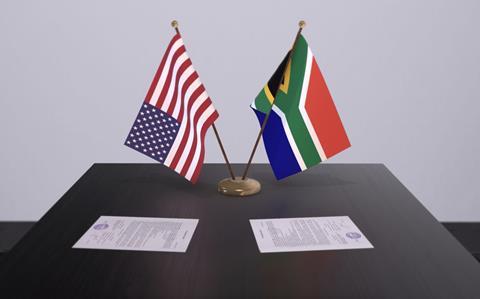Accusations of South African arms supplies to Russia angers the US and results in a media storm
South Africa’s membership of the African Growth and Opportunities Act (AGOA) seems to be on the line.

This is according to comments attributed to the US ambassador to South Africa, Reuben Brigety, who accused the South African Government of shipping arms to Russia.
The South African government has said it is neutral in the Russian invasion of Ukraine, officially stating it is promoting a negotiated settlement.
Commentators have said the US was now drawing a line in the sand, having said that South Africa’s actions did not reflect its neutrality. They have also said that the Ambassador would not have made such statements if he was not authorised to do so at the highest level.
Discussions around the review of AGOA have been going on for some time, but all seemed to go pear-shaped last week following the US diplomat’s comments.
Brigety said that a clause of the AGOA act stated that recipients of benefits could act in contravention of American interests. This should send warning signals to those in South Africa who benefit from the act.
For the South African fruit export industry to the US this is of major concern. They are already dealing with a very tough phytosanitary protocol which they have adapted to over the years.
AGOA brings trade advantages, which applies for all African trade with the US, allowing fruit exporters from South Africa to successfully implement their annual campaigns.
Most important for the fruit industries trading in the US is the Western Cape citrus business, which over more than two decades has built a significant market during the summer months by offering US consumers ‘Summer Citrus from South Africa’.
This year it is expected that South Africa will ship more than 80,000 tonnes of citrus to the US in a campaign which is due to start in earnest this week with the first of a series of conventional reefers due to leave Cape Town.
In recent years exports of apples, stonefruit and grapes have also been growing.
Sources have said that while the exports of citrus to the US is at this stage was restricted to the Western and Northern Cape regions, growers in the north and east of the country have also been hoping for access.
Efforts to get this done have been ongoing for at least four years with the final announcements gathering dust in Washington.
“Under current circumstances these efforts may be in vain,” said one source.
The news of US unhappiness with South Africa’s open support for Russia has sent the South African currency into free-fall against the US Dollar.
On Friday it was at the weakest level in 22 years – R19.30 to the US Dollar. The South African currency also dropped significantly against the euro and the British pound.
These exchange rates will initially boost income for fruit exporters, but there will be other side effects for the country which may negate these advantages.
Freight rates are paid in US dollars, inputs imported are priced in US dollars and in the end most returns from international markets are conducted via the US financial system.
Brigety, made the claims on Thursday (11 May), adding the “concerns” were raised by American senior officials with a high-level South African delegation that recently visited the US.
The cause of all the problems is a Russian vessel that docked at South Africa’s Simon’s Town naval base in December last year and left South Africa loaded with weapons, according to the US government.
More recently, there was a report of a Russian cargo aircraft arriving at the country’s main air force base, the Waterkloof base, outside the capital Pretoria.
Brigety told the media in Pretoria that Washington had established the vessel was loaded with weapons while docked.
There was controversy when the vessel docked, with Pretoria silent on its activities while in South African waters.
In recent months there has been a flurry of US diplomatic visits to Africa as the US has focused on improving relations with African nations.
Noticeably, these delegations, including the wife of the US president and the country’s vice-president, bypassed South Africa while visiting neighbouring nations.
Experts have noted that this is a far cry from relationships in the days of Nelson Mandela when South Africa was the first port of call for US diplomatic missions.






